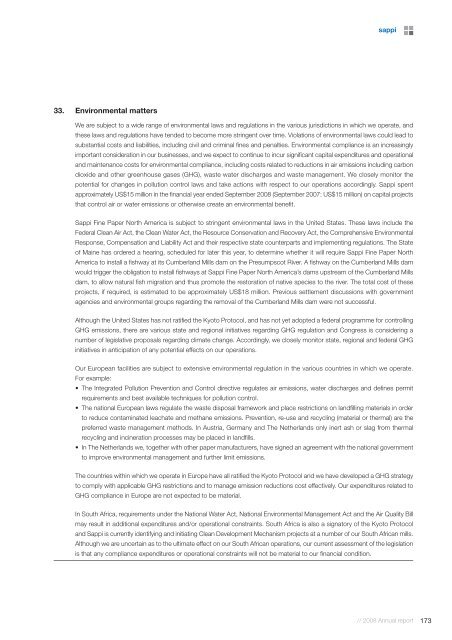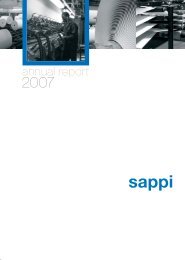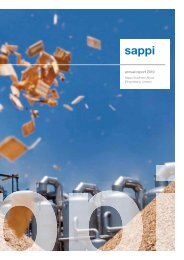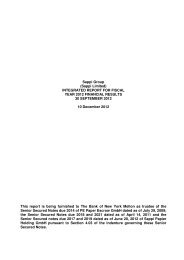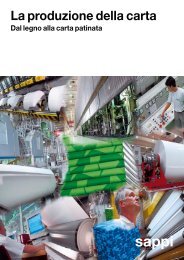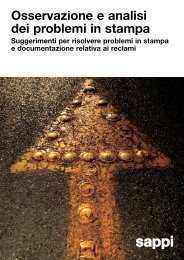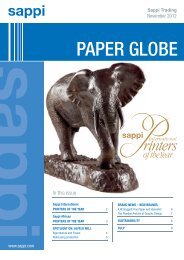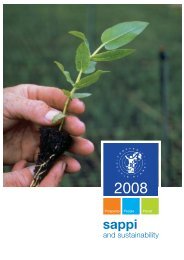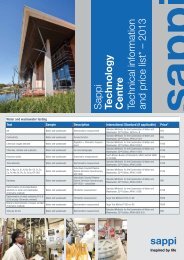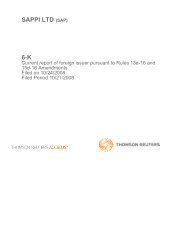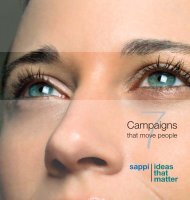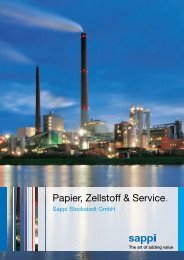2008 Annual report - Sappi
2008 Annual report - Sappi
2008 Annual report - Sappi
You also want an ePaper? Increase the reach of your titles
YUMPU automatically turns print PDFs into web optimized ePapers that Google loves.
sappi //<br />
33. Environmental matters<br />
We are subject to a wide range of environmental laws and regulations in the various jurisdictions in which we operate, and<br />
these laws and regulations have tended to become more stringent over time. Violations of environmental laws could lead to<br />
substantial costs and liabilities, including civil and criminal fines and penalties. Environmental compliance is an increasingly<br />
important consideration in our businesses, and we expect to continue to incur significant capital expenditures and operational<br />
and maintenance costs for environmental compliance, including costs related to reductions in air emissions including carbon<br />
dioxide and other greenhouse gases (GHG), waste water discharges and waste management. We closely monitor the<br />
potential for changes in pollution control laws and take actions with respect to our operations accordingly. <strong>Sappi</strong> spent<br />
approximately US$15 million in the financial year ended September <strong>2008</strong> (September 2007: US$15 million) on capital projects<br />
that control air or water emissions or otherwise create an environmental benefit.<br />
<strong>Sappi</strong> Fine Paper North America is subject to stringent environmental laws in the United States. These laws include the<br />
Federal Clean Air Act, the Clean Water Act, the Resource Conservation and Recovery Act, the Comprehensive Environmental<br />
Response, Compensation and Liability Act and their respective state counterparts and implementing regulations. The State<br />
of Maine has ordered a hearing, scheduled for later this year, to determine whether it will require <strong>Sappi</strong> Fine Paper North<br />
America to install a fishway at its Cumberland Mills dam on the Presumpscot River. A fishway on the Cumberland Mills dam<br />
would trigger the obligation to install fishways at <strong>Sappi</strong> Fine Paper North America’s dams upstream of the Cumberland Mills<br />
dam, to allow natural fish migration and thus promote the restoration of native species to the river. The total cost of these<br />
projects, if required, is estimated to be approximately US$18 million. Previous settlement discussions with government<br />
agencies and environmental groups regarding the removal of the Cumberland Mills dam were not successful.<br />
Although the United States has not ratified the Kyoto Protocol, and has not yet adopted a federal programme for controlling<br />
GHG emissions, there are various state and regional initiatives regarding GHG regulation and Congress is considering a<br />
number of legislative proposals regarding climate change. Accordingly, we closely monitor state, regional and federal GHG<br />
initiatives in anticipation of any potential effects on our operations.<br />
Our European facilities are subject to extensive environmental regulation in the various countries in which we operate.<br />
For example:<br />
• The Integrated Pollution Prevention and Control directive regulates air emissions, water discharges and defines permit<br />
requirements and best available techniques for pollution control.<br />
• The national European laws regulate the waste disposal framework and place restrictions on landfilling materials in order<br />
to reduce contaminated leachate and methane emissions. Prevention, re-use and recycling (material or thermal) are the<br />
preferred waste management methods. In Austria, Germany and The Netherlands only inert ash or slag from thermal<br />
recycling and incineration processes may be placed in landfills.<br />
• In The Netherlands we, together with other paper manufacturers, have signed an agreement with the national government<br />
to improve environmental management and further limit emissions.<br />
The countries within which we operate in Europe have all ratified the Kyoto Protocol and we have developed a GHG strategy<br />
to comply with applicable GHG restrictions and to manage emission reductions cost effectively. Our expenditures related to<br />
GHG compliance in Europe are not expected to be material.<br />
In South Africa, requirements under the National Water Act, National Environmental Management Act and the Air Quality Bill<br />
may result in additional expenditures and/or operational constraints. South Africa is also a signatory of the Kyoto Protocol<br />
and <strong>Sappi</strong> is currently identifying and initiating Clean Development Mechanism projects at a number of our South African mills.<br />
Although we are uncertain as to the ultimate effect on our South African operations, our current assessment of the legislation<br />
is that any compliance expenditures or operational constraints will not be material to our financial condition.<br />
// <strong>2008</strong> <strong>Annual</strong> <strong>report</strong><br />
173


